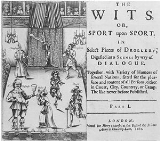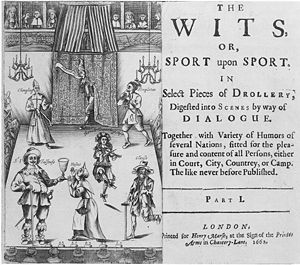
Droll
Encyclopedia

English Interregnum
The English Interregnum was the period of parliamentary and military rule by the Lord Protector Oliver Cromwell under the Commonwealth of England after the English Civil War...
in England
England
England is a country that is part of the United Kingdom. It shares land borders with Scotland to the north and Wales to the west; the Irish Sea is to the north west, the Celtic Sea to the south west, with the North Sea to the east and the English Channel to the south separating it from continental...
. With the closure of the theatres, actors were left without any way of plying their art. Borrowing scenes from well-known plays of the Elizabethan theatre, they added dancing and other entertainments and performed these, sometimes illegally, to make money
Money
Money is any object or record that is generally accepted as payment for goods and services and repayment of debts in a given country or socio-economic context. The main functions of money are distinguished as: a medium of exchange; a unit of account; a store of value; and, occasionally in the past,...
. Along with the popularity of the source play, material for drolls was generally chosen for physical humor or for wit.
Francis Kirkman
Francis Kirkman
Francis Kirkman appears in many roles in the English literary world of the second half of the seventeenth century, as a publisher, bookseller, librarian, author and bibliographer...
's The Wits, or Sport Upon Sport, 1662
1662 in literature
The year 1662 in literature involved some significant events.-Events:*September 29 - Samuel Pepys sees the King's Company production of A Midsummer Night's Dream...
, is a collection of twenty-seven drolls. Three are adapted from Shakespeare: Bottom the Weaver
Shakespeare in performance
Numerous performances of William Shakespeare's plays have occurred since the end of the 16th century. While Shakespeare was alive, many of his greatest plays were performed by the Lord Chamberlain's Men but King's Men acting companies at the Globe and Blackfriars Theatres...
from A Midsummer Night's Dream
A Midsummer Night's Dream
A Midsummer Night's Dream is a play that was written by William Shakespeare. It is believed to have been written between 1590 and 1596. It portrays the events surrounding the marriage of the Duke of Athens, Theseus, and the Queen of the Amazons, Hippolyta...
, the gravedigger's scene from Hamlet
Hamlet
The Tragical History of Hamlet, Prince of Denmark, or more simply Hamlet, is a tragedy by William Shakespeare, believed to have been written between 1599 and 1601...
, and a collection of scenes involving Falstaff
Falstaff
Sir John Falstaff is a fictional character who appears in three plays by William Shakespeare. In the two Henry IV plays, he is a companion to Prince Hal, the future King Henry V. A fat, vain, boastful, and cowardly knight, Falstaff leads the apparently wayward Prince Hal into trouble, and is...
called The Bouncing Knight. A typical droll presented a subplot from John Marston
John Marston
John Marston was an English poet, playwright and satirist during the late Elizabethan and Jacobean periods...
's The Dutch Courtesan; the piece runs together all the scenes in which a greedy vintner is gulled and robbed by a deranged gallant.
Just under half of the drolls in Kirkman's book are adapted from the work of Beaumont
Francis Beaumont
Francis Beaumont was a dramatist in the English Renaissance theatre, most famous for his collaborations with John Fletcher....
and Fletcher
John Fletcher (playwright)
John Fletcher was a Jacobean playwright. Following William Shakespeare as house playwright for the King's Men, he was among the most prolific and influential dramatists of his day; both during his lifetime and in the early Restoration, his fame rivalled Shakespeare's...
. Among the drolls taken from those authors are Forc'd Valour (the title plot from The Humorous Lieutenant), The Stallion (the scenes in the male brothel
Brothel
Brothels are business establishments where patrons can engage in sexual activities with prostitutes. Brothels are known under a variety of names, including bordello, cathouse, knocking shop, whorehouse, strumpet house, sporting house, house of ill repute, house of prostitution, and bawdy house...
from The Custom of the Country), and the taunting of Pharamond from Philaster. The prominence of Beaumont and Fletcher in this collection prefigures their dominance on the early Restoration stage. The extract from their Beggar's Bush, known as The Lame Commonwealth, features additional dialogue, strongly suggesting it was taken from a performance text. The character of Clause, the King of the Beggars
King of the Gypsies
The title King of the Gypsies has been claimed or given over the centuries to many different people. It is both culturally and geographically specific. It may be inherited, acquired by acclamation or action, or simply claimed. The extent of the power associated with the title varied; it might be...
in that extract, appears as a character in later works, such as the memoirs of Bampfylde Moore Carew
Bampfylde Moore Carew
Bampfylde Moore Carew was an English rogue, vagabond and impostor, who claimed to be King of the Beggars.He was the son of Reverend Theodore Carew, rector of Bickleigh. The Carews were a well-established Devonshire family. Although they had a reputation for adventurousness, Bampfylde Moore Carew...
, the self-proclaimed King of the Beggars.
Actor Robert Cox
Robert Cox (actor)
Robert Cox was a seventeenth-century English actor, best known for creating and performing the "drolls" that were a permitted form of dramatic entertainment during the English Civil War and the Interregnum, when theatres were officially closed and standard plays were not allowed.Gerard Langbaine...
was perhaps the best-known of the droll performers.

